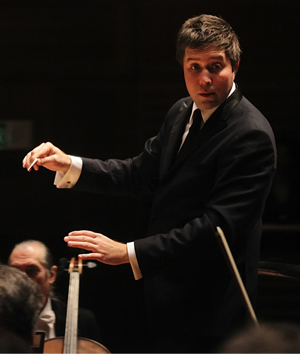North Carolina Opera has produced a number of fine stage productions over its first decade, but it has particularly excelled in presenting opera in concert, from the standard repertory (Faust; Aida) to the less-often produced (Rusalka; Eugene Onegin). In particular, the company holds a unique niche, for an organization of its size, in offering a continuing exploration of Richard Wagner’s works in concert, performed at a satisfyingly high level.
Sunday’s presentation of Act III of Siegfried in Meymandi Concert Hall was the fourth in a series that previously offered Act I of Walküre (2013), Act II of Tristan und Isolde (2014) ,and the complete Das Rheingold (2016). The prime advantage of hearing these works in concert is having the players onstage more readily to reveal all the intricacies and power of Wagner’s orchestral writing, an equal partner to the vocal writing.
The laudable through-line in all four NCO Wagner concert presentations has been conductor (and former company artistic and music director) Timothy Myers. Although he has proved adept at a wide range of operatic styles and periods, Myers seems particularly inspired by Wagner’s works, having gone from strength to strength in each of the four presentations here.
Myers fairly bristled with ready energy, setting a taunt pace and a hall-filling sweep with the first phrases of the act’s prelude. From there, he led the eighty-member orchestra through an hour and twenty minutes of thrilling climaxes and exquisitely hushed intimate moments. Myers pointed up all the layered motifs that swirl through the act, bringing forth an astonishing clarity and precision from the players. The French horns, trombones and tubas were particularly impressive in their many exposed and tricky phrases, especially in those sudden, ominous outbursts. Likewise, the violins, in those whirling, wispy phrases right before Siegfried reaches Brünnhilde on the mountaintop, were breathtakingly ethereal.
The four roles were well cast with youngish singers who were confident, polished and appealing. The simple staging had them enter and exit at appropriate times in the libretto. They brought their scores on with them and stood before music stands, engaging in enough expressions and movements to give indications of their characters’ moods and emotions.
Bass-baritone Musa Ngqungwana exhibited a large, powerful voice as The Wanderer (the god Wotan in disguise), with a brighter, more ringing sound than is usually associated with the character. He had warm rounded tone in the introspective moments and could pour out the volume in the climatic sections, although sometimes leaning toward hectoring to ride the orchestration.
Wotan’s contentious encounter with Erda, the goddess of wisdom, was dramatically delivered through Nicole Piccolomini‘s rich, velvety mezzo-soprano and her attentive, subtle acting. Her use of chest voice for emphasis made it plain Erda was not happy with Wotan’s punishment of Brünnhilde.
Tenor Richard Cox had earlier proved himself a Wagner singer as Loge in the 2016 NCO Rheingold and impressed further in this first Siegfried. Although not a voice of heldentenor heft, he was able to make the hero sound truly young and innocent, using an attractive clarity and ease for the less intense moments, while producing thrilling high notes and soaring phrases without noticeable strain.
Cox reached even greater heights once into the final scene with Brünnhilde and her growing understanding that Siegfried is her destined lover. From the moment soprano Alexandra LoBianco arrived on stage and began the heroine’s awakening, she signaled a deeply realized characterization with her body language and facial expressions even before she sang a note. Once into the first part of her interaction with Siegfried, LoBianco displayed tonal beauty and warmth reminiscent of her previous NCO performance as Tosca earlier this year. What no one was prepared for was the stunning volume and accuracy with which she tossed out gleaming high note after high note. As Wagner’s passionate rush toward an ecstatic finale built between the two characters, Cox and LoBianco wowed with their stamina and unstinting power.
From first note to last, the audience was intensely engaged for all eighty minutes, unusually quiet and undistracted. It was a tribute to all parties involved in this most satisfying afternoon, one that marks another high bar for the company to measure success by.











